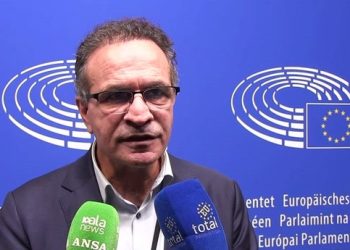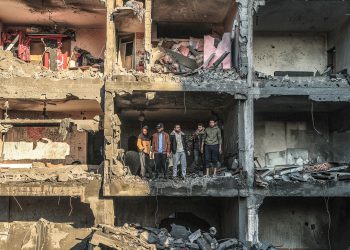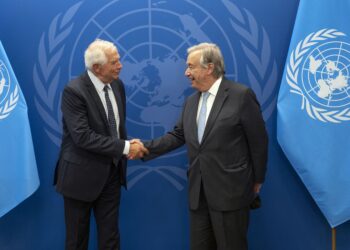Brussels – “Deeply shocked” by the Integrated Food Security Phase Classification (IPC) assessment on the food crisis in Gaza. The EU High Representative for Foreign Affairs, Josep Borrell, and the Commissioner for Crisis Management, Janez Lenarčič, speak of a “wake-up call for the whole world to act now to prevent a deadly human catastrophe.” But they never call Israel into question.
According to the classification system developed in 2004 by the FAO, the UN Food and Agriculture Agency, between Dec. 8, 2023, and Feb. 7, 2024, the entire population of the Gaza Strip – about 2.2 million people – will be at least IPC Phase 3, what is called the crisis phase. “This is the highest share of people facing high levels of acute food insecurity that the IPC initiative has ever classified for any given area or country,” the assessment points out.

But the scenario is even more dramatic. Because about 50 percent of the population (1.17 million people) are already in Phase 4, in an emergency situation, and at least one in four households – more than half a million people – are on the final rung of the ladder: those in Phase 5 are facing “catastrophic conditions” and “extreme lack of food”.
It is not the result of a natural disaster, an extreme drought, or an impressive flood: “Hostilities, bombing, ground operations, and the besiegement of the entire population, reduced access to food, basic services and life-saving assistance, and the extreme concentration or isolation of people in inadequate shelters or areas lacking basic services, are the main factors” contributing to these catastrophic levels of acute food insecurity across the Gaza Strip, with an increasingly palpable risk of famine.

It is the military strategy deployed by Israel that has reduced the inhabitants of Gaza to starvation.”Hostilities, including bombardment, ground operations, and the besiegement of the entire population, have caused catastrophic levels of acute food insecurity throughout the Gaza Strip,” the IPC denounces. Despite this, the European Union chooses not to call Israel directly into question. The joint statement of Borrell and Lenarčič, who in Ursula von der Leyen’s cabinet are nonetheless the most critical of Israel’s treatment of the Palestinian population, proves this yet again.
“We urgently need continued, rapid, safe, and unhindered humanitarian access to prevent a further deterioration of an already catastrophic situation,” Borrell and Lenarčič warn. “We reiterate the urgent call for respect of international humanitarian law. Aid must reach those in need through all necessary means, including humanitarian corridors and pauses for humanitarian needs.” Not once is the responsibility attributed to Israel.
The two then review the numbers of the European mobilization: 100 million euros in humanitarian aid to Gaza, including 46 million “specifically dedicated to food assistance and to cover health and other basic needs.” And 125 million already earmarked for 2024: resources mobilized for the survival of a people who perhaps would also need harsher words towards Israel.
English version by the Translation Service of Withub





![Una donna controlla le informazioni sul cibo specificate sulla confezione [foto: archivio]](https://www.eunews.it/wp-content/uploads/2014/12/Etichette-alimentari.jpg)

